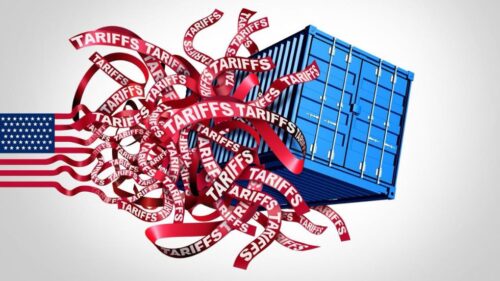On April 2, 2025, US President Donald Trump announced a sweeping package of tariffs, which he labeled “Liberation Day” measures. These tariffs disrupted longstanding expectations in international politics and global trade. While Trump did announce a 90-day pause on the full implementation, excluding China, which continued to be subject to a tariff of 145% — now 10% —, public markets reacted. Stock indices in the United States, China, Japan and India dropped significantly. The pause provided temporary relief, but the broader landscape remains volatile.
These disruptions have extended beyond public markets into private capital. Rising trade barriers and unpredictable policy shifts have forced investors to rethink how they allocate capital across borders.
Venture capital (VC) firms now operate in an environment where globalization no longer offers stability. The VC industry had already entered a correctional phase, with valuations declining and limited partners tightening commitments. However, growing geopolitical risk has made the structural weaknesses more apparent. In June 2023, Sequoia Capital — a dominant force in global venture investing — split into three independent firms: Sequoia US & Europe, Peak XV in India/Southeast Asia and HongShan in China. The move signaled a shift from integrated global investment platforms to regionally contained strategies.
Pivoting to domestic investments
Faced with a more fragmented world, VCs have begun to move capital away from startups that rely on hardware production, physical supply chains or international logistics. These ventures now carry too much geopolitical baggage. Instead, they are prioritizing asset-light technologies that offer scalability without exposure to trade friction or supply chain bottlenecks. These technologies, such as artificial intelligence (AI), decentralized finance (DeFi) and blockchain systems (cryptographically secured, decentralized ledgers that allow participants to verify transactions without centralized control), are designed for distribution across networks rather than borders. Even platforms that have lost favor in recent years, like Web3, which build on blockchain to enable peer-to-peer applications, are now reappearing on investor radars.
This pivot reflects more than risk aversion. Investors now view digital-first companies as strategically aligned with an economic future shaped by national borders and technological sovereignty. These startups attract capital not just for their growth potential but because they can operate independently of global chokepoints, such as tariffs or supply train disruptions.
Recent fund movements illustrate this realignment. In March 2024, Bain Capital Ventures launched a $560 million fund focused on building blockchain infrastructure and supporting decentralized financial systems. Sequoia soon followed, raising a $200 million sub-fund for liquid crypto tokens and early-stage Web3 ventures. Both firms doubled down on technologies that declined in public confidence after the collapse of FTX, a former cryptocurrency exchange and hedge fund, but now appear essential to long-term strategy.
Deregulation sweetens the pot
US domestic policy has reinforced this redirection. The Trump administration has taken deliberate steps to roll back regulatory oversight on cryptocurrency markets, with further deregulation expected. Trump has publicly vowed to transform the United States into what he calls the “crypto capital” of the world. This political support has breathed new life into investor interest in digital assets, which had lost momentum under tightening regulations abroad.
This shift extends beyond cryptocurrency. AI companies continue to benefit from regulatory inaction. The Trump administration has shown little appetite for extensive AI regulation, largely due to geopolitical rivalry with China and vocal opposition from the US technology sector. Industry leaders argue that regulation would stifle innovation and slow America’s competitive edge in critical technologies.
Policymakers have also restricted exports of advanced semiconductors and high-performance computing equipment to preserve domestic dominance in AI. In response, China has limited exports of rare earth elements and other critical minerals used in chip manufacturing. This standoff has further raised the stakes for VCs, who must now weigh the national affiliations of their technologies as much as their market potential.
The Trump-era measures didn’t originate this fragmentation, but they intensified it. VC firms look to the future as the global order fractures, and they find that digital-first technologies offer something rare: scalability without exposure. For them, the future lies in software-driven systems that can grow inside political borders while connecting across them.
[Kaitlyn Diana edited this piece]
The views expressed in this article are the author’s own and do not necessarily reflect Fair Observer’s editorial policy.
Support Fair Observer
We rely on your support for our independence, diversity and quality.
For more than 10 years, Fair Observer has been free, fair and independent. No billionaire owns us, no advertisers control us. We are a reader-supported nonprofit. Unlike many other publications, we keep our content free for readers regardless of where they live or whether they can afford to pay. We have no paywalls and no ads.
In the post-truth era of fake news, echo chambers and filter bubbles, we publish a plurality of perspectives from around the world. Anyone can publish with us, but everyone goes through a rigorous editorial process. So, you get fact-checked, well-reasoned content instead of noise.
We publish 3,000+ voices from 90+ countries. We also conduct education and training programs
on subjects ranging from digital media and journalism to writing and critical thinking. This
doesn’t come cheap. Servers, editors, trainers and web developers cost
money.
Please consider supporting us on a regular basis as a recurring donor or a
sustaining member.
Will you support FO’s journalism?
We rely on your support for our independence, diversity and quality.












Comment